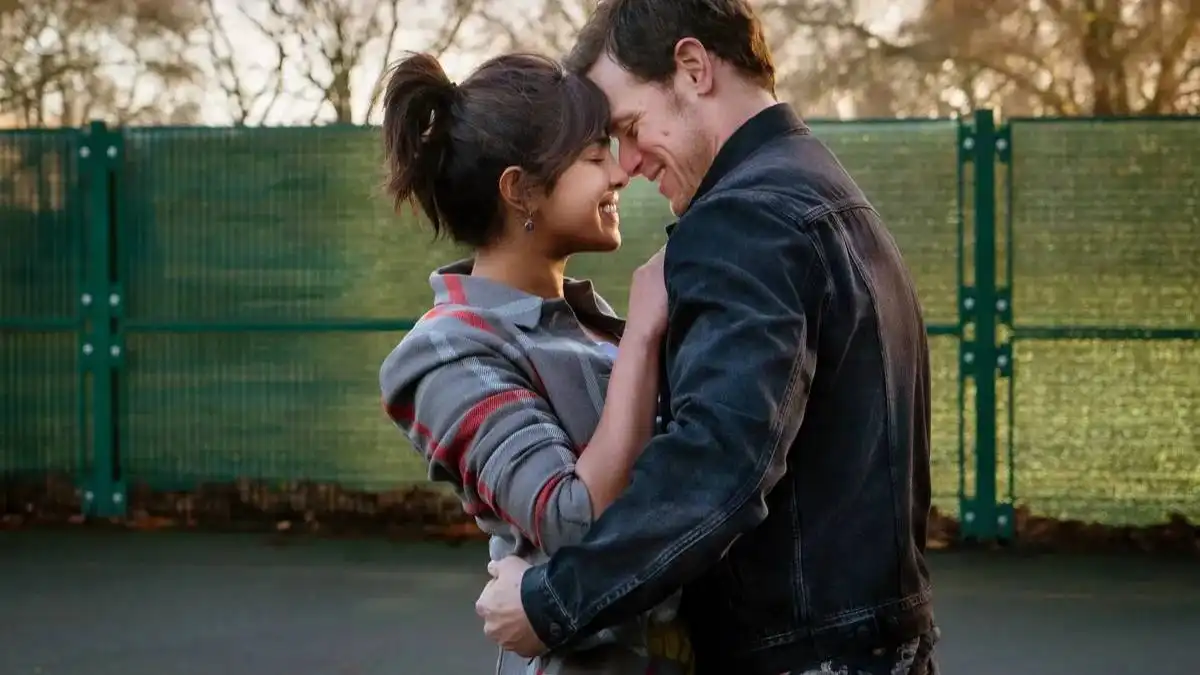Love Again: Priyanka Chopra-Sam Heughan Romcom Turns Love & Grief Into Flimsy Hashtags
This is #CineFile where our critic Rahul Desai goes beyond the obvious takes, to dissect movies and shows that are in the news. Today: Love Again.
May 12, 2023

WHY is it that romcoms are a dead genre today? I don’t have a definitive theory, but I suspect it has something to do with technology. (It’s the same for romantic dramas — otherwise known as “love stories”.) The vintage romantic comedy comes from an era of phone calls, chance meetings and face-to-face chemistry. The language of dating, wooing, loving, flirting and grieving was different. A lot of the narrative tropes were derived from the directness of discovering and losing a person…in person. Communication felt more exclusive, more private. But cell phones and the internet have changed the romance of accessibility, for better or worse. Text messages leave little to no room for mystery and interpretation. Feelings get written before being felt. Before you think I’m some cranky old boomer on a rant, let me just finish making my point: The cinema of love and companionship hasn’t adapted to this keypad grammar. The narrative tropes are still old, even though the world — and the anatomy of the heart — is new. The characters still speak and emote like pre-internet-age humans with devices in their hands.
Love Again — a remake of a movie that was an adaptation of a book — is another brick in this dissonant wall. It’s frightfully bland and superficial, which takes some doing for a story that opens with a death and explores loss through the lens of technology. The premise has P.S. I Love You-level potential. Love Again stars Priyanka Chopra Jonas as Mira Ray, an Indian-American illustrator who loses her fiance, struggles to cope, sends a series of messages to his old number, and falls for the man that this number has been reassigned to. There’s more. This man, Rob (Sam Heughan), is a music critic working on a Celine Dion profile. He’s a purist, so he looks down on ‘popular’ legacies like hers. The Canadian singer stars as herself, so that Rob can discover that all her corny lyrics over the years are not that corny after all. She becomes a love guru of sorts, guiding him through the empty canals of complex love.
See what I mean? The theme of Morose Mira subverting the “grief is love with nowhere to go” theme — the heartbreaking vulnerability of her texts to her dead boyfriend is what makes Rob fall in love with her and find her (which, as you may imagine, becomes the conflict) — should have been enough for the film. He is disarmed by her naked words in an age of curated flirting and Gen Z catchphrases. He sees the real Mira, before seeking her out and working backward to reach the textual part of her. (Rob would make for an unethical therapist, but that’s for another day.) This should have been enough, really. But no, the film had to put in Celine Dion to make the whole thing sweet and fluffy. It’s almost like the writing is too afraid of depth, so the funny celebrity cameo becomes the balancer.
You can tell the film’s adolescence from how we see Mira cry only once, that too in a passing shot. She looks sad, but in a very fringe-haircut-aesthetic sort of ornamental way. You can also tell from the meet-cute of Mira and Rob — it plays out like a dream where he’s imagining the most charming version of her. But it’s apparently real, and she suddenly looks and sounds nothing like the mopey 30-something artist she is introduced as. It doesn’t help that Priyanka Chopra Jonas overdoes the giggling and bashfulness, while Sam Heughan acts like a man who knows he’s hunky and British.
There are a few nice touches. Like Rob’s editor pretending to criticise his personal essay in the paper (which sounds awfully basic, by the way) so that other reporters don’t pitch similar pieces. Or like Mira loving her way through grief and grieving her way through love at once. But the template is too clean and shiny. For example, what’s the deal with Mira’s work? She’s famous for a series of children’s books about a caterpillar called Bhoomi — unimaginative plot dressing, given that we immediately detect the caterpillar-to-butterfly metaphor. What’s the deal with her annoying sister? What’s the deal with Rob’s annoying stock-diversity colleagues? Why does this film have to be a romcom with romcom-mie moments (of course they reunite in the snow) and more romcom-mie moments (of course they eat cereal after a cooking disaster on the first date) and less romcom-mie moments (of course his fetching creepiness is validated because he quoted Celine Dion’s lyrics in his article). Why does everyone have to be so obviously pretty and predictable? Why is it that Indian stars who make it in the West are judged as businesspeople and not artists? To quote the late, great Logan Roy: You are not serious figures.
Share